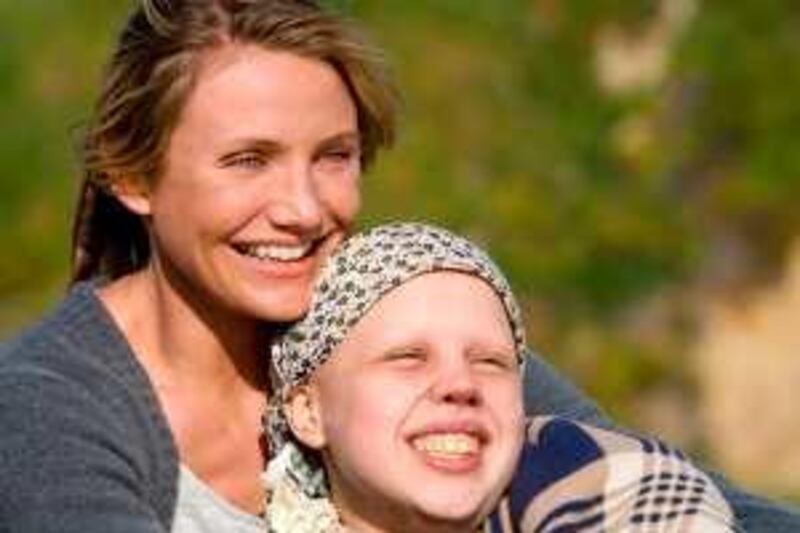My Sister's Keeper That Nick Cassavetes, the director of My Sister's Keeper, was also the director of 2004's The Notebook should alert you to stock up on tissues before settling down to this film. Heck, splash out and buy a whole new box just for the occasion. The Notebook pulled tears from their ducts by the salty cupful. So too will My Sister's Keeper.
The story is based on a novel by Jodi Picoult, adapted for the screen by Cassavetes and another Notebook screenwriter, Jeremy Leven. Our protagonist is 11-year-old Anna (Little Miss Sunshine's Abigail Breslin), who came into this world not because of her parents' fervent desire for a third addition to their brood, but because their first daughter, Kate (Sofia Vassilieva), had been diagnosed with leukaemia. The temporary solution? Have another child, whispers a doctor, because they could engineer a 100 per cent blood match and treat Kate with it.
This they do, using Anna's body as if playing a game of Operation - harvesting her blood and bone marrow through the years until she's asked for a kidney. This is one step too far, and Anna approaches a flashy television lawyer, Campbell Alexander (a congenial Alec Baldwin), to petition her parents for "medical emancipation". Anna is fed up with being used. She wants to be able to run around in future. Perhaps become a cheerleader.
Her mother, Sara (Cameron Diaz), is furious. This is a woman who has spent so long caring for her sick daughter that she has forgotten how to live herself. She duly goes to court to oppose the motion, which, handily, she can do herself because she used to be a lawyer. Diaz as a brainy lawyer and impassioned mother? It was a brave roll of the dice by the casting team, but one with which they can claim victory. It is a fairly one-dimensional role, but she's suitably wrung out and wretched. Her husband, Brian (Jason Patric), plays second fiddle to his wife, and it is much the same for the third child, Jesse (Evan Ellingson), whose role in the film is all too peripheral. Moody, frowning faces tell us he's troubled, but apart from a brief reference to dyslexia, this is left undeveloped.
Flashbacks are used constantly to explain the back story to Kate's illness and the family's adaptation to it. As soon as one character goes glassy-eyed and the camera homes in on them, you know you're about to jump a few years. It is clumsily done, though, because continuity is too churned up. In one scene, we see Sara shave her blonde hair off in solidarity with her bald daughter. In the next, those shiny, trademark Diaz locks are back again. What? Is the woman Rapunzel?
On the upside, the story presents a striking, compelling clash of ethics throughout, and one wonders why the two sisters don't fall out over the kidney saga right up until the twist is revealed near the end. Watch out for those tears though: they flow from the very beginning. In particular, Cassavetes deserves commendation for his stark depiction of the disease. There is little by way of Hollywood gloss when it comes to the hospital scenes. Kate is shown with transparent, bluish skin and chapped lips. Her hair falls out in clumps during chemotherapy, and we see her throwing up violently into a bin after a session.
It is on the ward that a brief love story develops with a fellow sufferer called Taylor (Thomas Dekker). Their meeting is turned into a young-love sub-plot, poignant because we are dogged by the sense that it will be a fleeting one. It is a storyline that is dealt with too briefly, but allows for at least a short respite from the unremitting grimness elsewhere. Naturally, you're primed for an unhappy ending, although the film differs from the book here, which provoked consternation among hard-core Picoult fans.
Do you get the sense that you are being mawkishly exploited for those tears, as plenty of people said when the film was first released and cinemas resounded with the sound of nose-blowing? You can perhaps feel this very slightly. But it is a film about a young girl dying from leukaemia. You're not likely to find many laughs there, are you?





